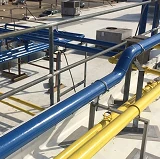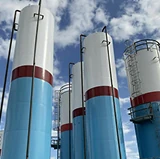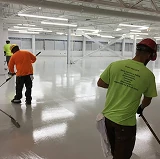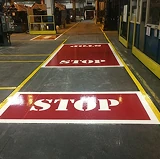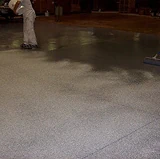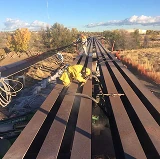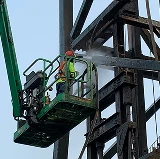Get an Estimate!
"*" indicates required fields
Industrial painting for chemical processing plants.
Chemical manufacturing companies can rely on Painters USA for safe and experienced painting, coating, and flooring services.
Whether chemical processing is what you do or chemicals play a big role in your industrial operations, these reactive and potentially hazardous materials require a safe and orderly environment across every building component.
Painters USA is widely experienced and knowledgeable about paints, coatings, and flooring requirements for the chemical processing industry. We have OSHA-trained crews, extensive product knowledge, decades of proper application experience, and all the equipment and infrastructure necessary to work in exacting environments. Safety and compliance with all regulations are paramount in every project we do.
Common types of chemical corrosion
Painters USA is familiar with the most common types of corrosive wear and tear in chemical plants:
- Uniform corrosion usually occurs on unprotected structures and eventually weakens those surfaces and structures.
- Galvanic corrosion results when two or more dissimilar metals are in contact with each other and share a common environment.
- Crevice corrosion occurs when airborne contaminants like chemical salts collect and combine with moisture in areas that are hard to access and difficult to protect.
- Pitting or pit corrosion is insidious, as it’s caused by tiny pinholes and holidays in coating systems that can occur with improper coating products or inferior application.
- Stress corrosion cracking is due to tensile stress, usually caused by operational temperature differences, in combination with a corrosive chemical medium.
Extensive training and certifications combined with decades of chemical plant experience enables the NACE-certified inspectors at Painters USA to spot problems that other contractors often miss. We can also safely reach areas that are difficult to access.
For more on corrosion: Journal of Protective Coatings & Linings
Surface prep for any structures and surfaces
Proper industrial cleaning and surface preparation are critical steps in any chemical plant painting or coating project. Painters USA commonly uses pressure washing with detergents and chemicals to neutralize the surface and remove visible and non-visible contaminants.
We may recommend abrasive blasting using an appropriate blasting medium for the surface and operating conditions. If abrasive blasting is not practical, we can use manual cleaning methods. While this increases upfront costs due to additional prep time, it saves time and money in the long run by maximizing performance and service life.
Whichever industrial cleaning method we use, once the surface is decontaminated, we address failed areas. Existing coatings are removed to an acceptable condition for adherence and feathered if necessary, which is a technique that creates a gradual transition from a tightly adhered coating to an exposed surface.
Warehouse Painting FAQs
Due to the risks of toxicity and flammability, painting and coating projects in chemical process plants require a focus on safety, during the project itself and to leave the site enhanced for workplace safety. OSHA requirements for chemical handling are lengthy and stringent, as even trips and falls can have added complications and consequences in places where hazardous chemicals are stored and used.
In addition, chemical processing facilities are often exposed to climate and environmental extremes and temperature variations from freezing cold to high heat. With offices in Texas and Illinois and national account experience, we have experiencing dealing with all these conditions.
We’re happy to offer consulting and guidance on painting techniques to enhance workplace safety and protect worker health, including OSHA color coding for piping systems, reaction vessels, and storage tanks; anti-skid floor coatings; and markings to identify locations of fire suppression and firefighting equipment and emergency treatment areas like eye wash or shower stations.
Our happy clients. Both big and small

Ready to get an estimate?
Submit your request online for a response within one business day or call us at 800-999-8715. (M-F, 8am-5pm CT)
